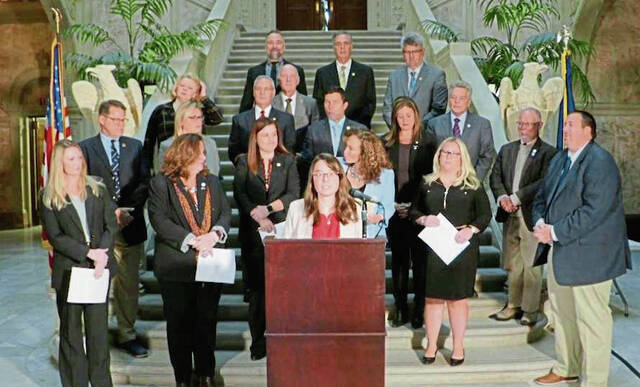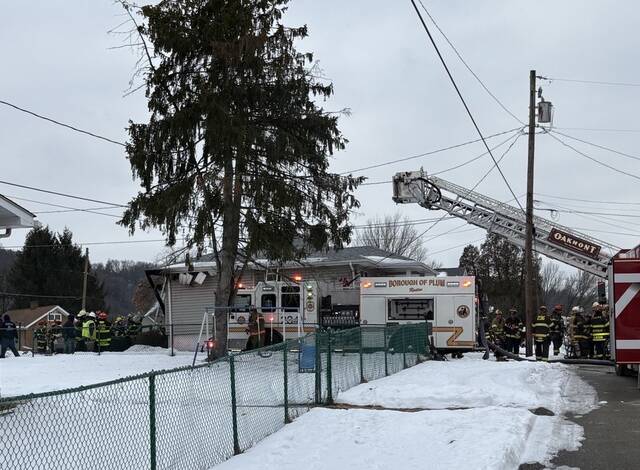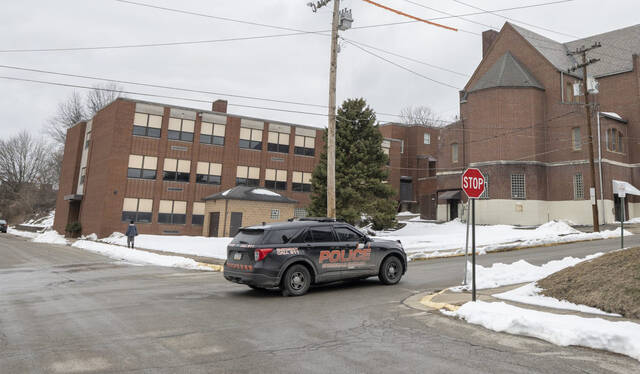Taxpayers no longer would foot the bill when the state settles cases in which state lawmakers are accused of sexual misconduct under a legislative package proposed Wednesday by members of the Pennsylvania House Republican Caucus.
“This will ensure perpetrators don’t get off scot-free,” said state Rep. Charity Grimm Krupa, R-Fayette. “Actions have consequences.”
Krupa was among a group of lawmakers in Harrisburg to unveil five bills to enforce reforms that address legislative ethical conduct rules, protect the identity of victims from Right-to-Know Act requests and track payments to victims of harassment through settlement agreements, among other issues.
Other sponsors of the package included state Reps. Abby Major, R-Leechburg; Kate Klunk, R-York; Donna Scheuren, R-Montgomery; and Ann Flood, R-Northampton.
“I think, if their own finances are in jeopardy, it will make a difference,” Major said of politicians.
Several Democrats reached out to Major in support of the bill package, she said.
In October, the state paid a $295,000 sexual harassment settlement to a woman who worked for Mike Vereb, former secretary of legislative affairs for Gov. Josh Shapiro.
It is unclear how much the state has paid in recent years because many of the settlements are kept out of the public eye.
“Half of this is done in darkness, and people never find out about it,” Major said. “Sexual harassment is usually not about sex; it’s about power. The goal is to leave victims feeling powerless, but it also leaves women shocked into silence.”
One of the proposed bills would make information public on every settlement paid for sexual harassment or assault by state employees.
“It puts the information out in the public, which I think is a deterrent,” Major said. “I think we’re at a point where people don’t want to put up with that kind of behavior from their state lawmakers anymore.”
On Tuesday, related legislation was introduced by state Sen. Kim Ward, R-Hempfield, and others to increase protective measures regarding sexual harassment at work.
One bill would require state agencies and the General Assembly to use a third party to investigate harassment claims by an employee.
“As leaders, we need to set the standard to create a safe workplace environment for all in practice and law when it comes to instances of sexual harassment. The recent sexual harassment incidents in the Capitol have presented us with a learning opportunity that we can and should do better,” said Ward, who co-sponsored the bill with Sen. Maria Collett, D-Montgomery.
“Sexual harassment is not a political issue. It is a human issue. While we can’t eradicate all instances, we can do our best to address these matters swiftly and ensure transparency in how taxpayer funds are disbursed.”
The second bill, sponsored by Sens. Kristin Phillips-Hill and Tracy Pennycuick, would require the public posting in the Pennsylvania Bulletin of monetary nondisclosure agreements due to any sexual harassment or misconduct claim by an employee.
If approved, both laws would apply to state government employees in all agencies.
At least 130 lawmakers across the country have been accused of sexual harassment since 2013, with actual numbers likely three times that because of underreporting, according to Emma Davidson Tribbs, co-founder of the National Women’s Defense League, a nonpartisan group that advocates for victims.
The League this week released a report detailing the past decade of abuse in government.
“Sexual harassment by sitting lawmakers is pervasive and ongoing,” Tribbs said.
“This isn’t a single-party issue,” she said. “It is a systemic, underregulated abuse of power.”
State Sen. Lindsey Williams, D-West View, said she backs efforts to strengthen sexual harassment protections.
In January, she worked with Sen. Katie Muth to introduce Senate Resolution 5, which bolsters existing sexual harassment rules in the state Senate by providing protection to everyone working with members, officers or employees of the state, including outside contractors, lobbyists and visitors.
“It means that anyone working with the Senate in any capacity would be protected from sexual harassment,” Williams said. “It should not matter where your paycheck comes from or which side of the building you are working on. Everyone who comes to the Capitol to work or visit should be safe from harassment.”
The resolution is stalled in committee and has yet to be acted on.
In Pennsylvania, five lawmakers were identified in the 49-page report from the National Women’s Defense League that documented claims of sexual harassment by lawmakers across the country.
• Democratic state Rep. Tom Caltagirone served the Reading area for 43 years. In December 2015, the state paid nearly $250,000 to settle a sexual harassment complaint brought by a staffer. Caltagirone remained in office until 2020.
• Republican state Rep. Brian Ellis of Butler was investigated in January 2019 by the Dauphin County District Attorney’s Office after being accused of raping a female state employee. Ellis resigned from office that year.
• Democratic state Sen. Daylin Leach of Montgomery County faced 11 accusations in December 2017 of inappropriately touching young female staffers and volunteers. Leach denied the accusations, and an auditor’s report commissioned by the Pennsylvania Democratic Caucus concluded there was no evidence of actionable discrimination for harassment in violation of applicable law or caucus policies. Leach remained in office until 2020.
• Republican state Rep. Nick Miccarelli of Delaware County was accused in 2018 by a lobbyist and a fellow lawmaker of sexual and physical assault spanning six years. He remained in office until his term concluded that year.
• Democratic state Rep. Mike Zabel of Delaware County was accused of sexually harassing his former campaign manager in 2018 and a lobbyist in 2023, in addition to Major. He resigned from office.
Major declined to discuss her claim against Zabel. She said that with more women being elected to state office and more women working in the Capitol, “it’s of utmost importance to do better and change the culture in Harrisburg.”
The League’s report detailed accusations against lawmakers for harassment of staffers, lobbyists, fellow lawmakers and journalists.
Tribbs said there is historically little accountability for such behavior. In 55% of instances, no action was taken; 90% of accused lawmakers are reelected, she said.
“We’ve seen this pattern play out over and over without a coordinated effort to change the system,” Tribbs said.
Her conclusion was that the current system for prevention is insufficient: There is a fundamental lack of transparency and accountability.
Internal dispositions without public acknowledgment protect abusive environments, she said.
The bills introduced Wednesday aim to change that system.
They include:
• An amendment to the House Ethical Conduct Rules to add “nonverbal acts” to the definition of sexual harassment; expand the rules to include a prohibition on members and officers of the House from engaging in sexual harassment while performing House-related services or duties, or in any House-owned or leased property; allow a person to appeal their ethics complaint if it is dismissed after a preliminary investigation; and increase transparency related to the number of complaints filed before the Ethics Committee and their disposition.
• An amendment to the state’s Right-to-Know Law to redact the names of victims of sexual harassment or assault before a settlement agreement is released to the public.
“It’s unacceptable that information as sensitive as a victim’s name can be accessed by the public through the Right-to-Know process, jeopardizing their safety and privacy,” Klunk said. “It’s important to clearly state this confidentiality expansion is for victims, not their perpetrators.”
• An amendment to the PennWATCH Act to include information on each settlement paid to a person or employee of a state agency, as a result of an action taken by an employee of a state agency. This bill promotes transparency, Scheuren said.
“By including settlement information on PennWATCH, residents will have a clearer picture of what is happening in state government and how their taxpayer dollars are being spent,” she said. “I would argue this would also serve as a deterrent against sexual harassment and other inappropriate behavior.”
• A bill to establish detailed framework that seeks reimbursement from perpetrators whose actions resulted in settlements paid by the state.
“The cost of their failure to conduct themselves accordingly should not be borne by innocent taxpayers while they resign to enjoy their tax-funded pensions and salaries,” Krupa said.
• A bill to codify existing federal protections into law and support victims in speaking out.
“This bill will encourage victims to speak out without fear of retribution,” Flood said.
The bill would enshrine the federal nondisclosure agreement law into state law. It also would stop the enforcement of pre-employment nondisclosure agreements and nondisparagement agreements between employers and employees and independent contractors, and between goods and services providers and consumers.
Major said the mission of the legislative package is to make Harrisburg safe for “generations of strong women.”
“If we’re going to be the makers of laws,” she said, “we need to obey them ourselves.”








